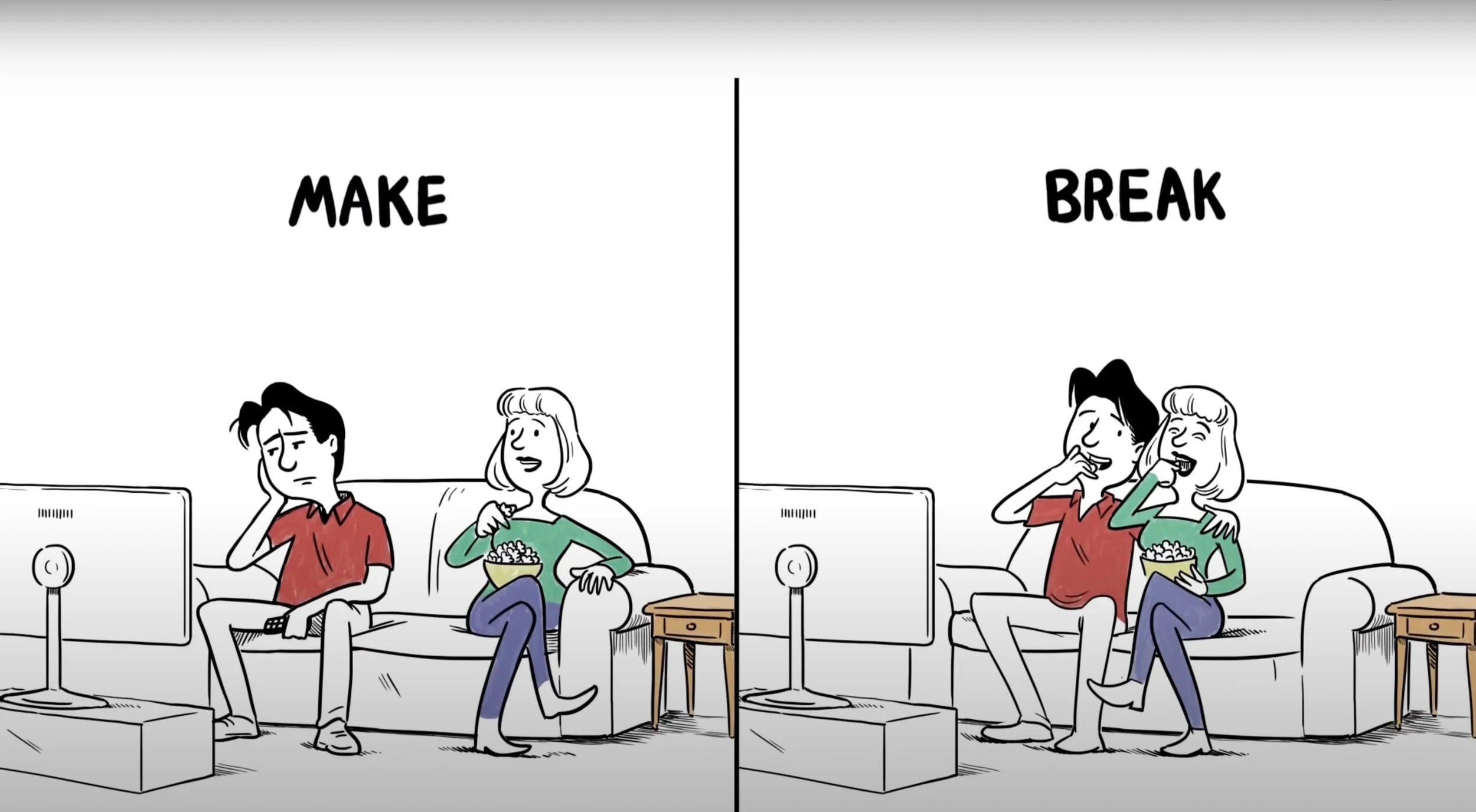Social, Relationship & Community Support
Video of the Month
“The easiest way to improve your relationship is to pay attention to your partner during life’s small, everyday moments. This video shows you how.”
Malavika’s note: In my experience, this advice regarding how to recognize and turn toward emotional bids works with friends and family members as well, in addition to romantic partners.
The Easiest Way to Improve Your Relationship | The Gottman Institute (02:10)
Blogs & Articles
Empowered Women, Empowering Women
I know my mom’s hesitation and self-doubt when it comes to picking up new skills or speaking to people about her work doesn’t arise from her inability to complete these tasks. Instead, these limitations directly result from her belief that certain tasks are outside the scope of her capabilities.
I think the vast majority of us have women in our lives who could use a stronger support system to assure them that they’re entitled to their own hopes and dreams and an identity outside of their family roles. Even beyond that, with a limitless ability to learn, each of them are capable of changing the world in whichever capacity they wish to.
In addition to rewriting the subconscious gender-guided biases in our own thinking as such, I’ve put together this short list of approaches we can take to empower the women in our lives.

My Favorite Resources
-
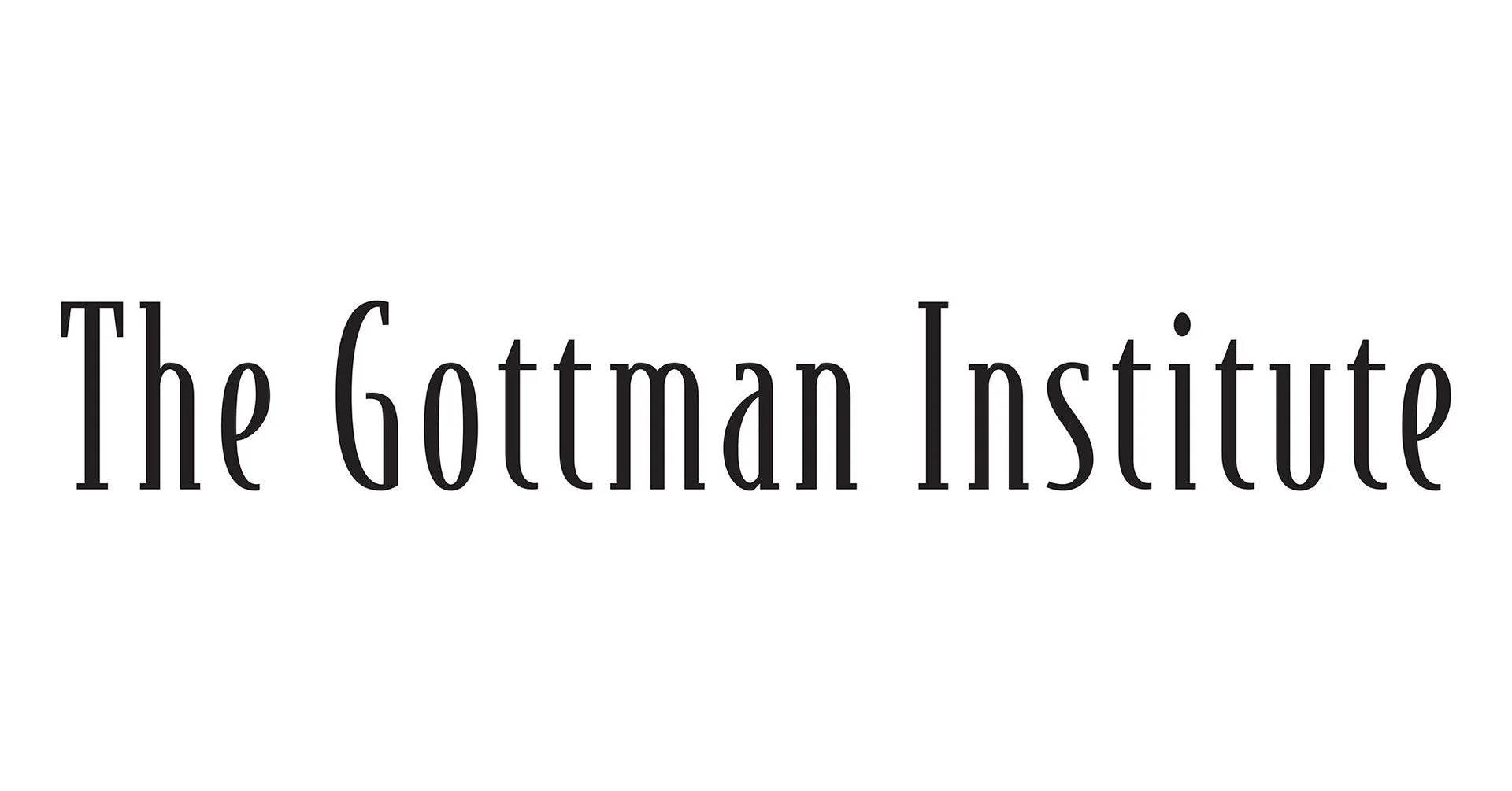
Dr. Julie & John Gottman: What are the "Four Horsemen of the Apocalypse" & How Can We Avoid Them?
“For over 40 years, Drs. John and Julie Gottman have devoted their life to the research and practice of fostering healthy, long-lasting relationships through the training of clinicians and the creation of transformative products for couples around the world.
Dr. John Gottman discovered four negative behaviors, or “The Four Horsemen of the Apocalypse,” that spell disaster for any relationship. Learn what they are and how to avoid them.”
-

Julie Menanno's "The Secure Relationship"
The Secure Relationship is a platform of easily-accessible and understandable guidance about how to create emotional safety within relationships, effectively navigate conflicts with loved ones, validate others’ feelings without kicking aside our own, and establishing and honoring boundaries (among other topics).
Its creator Julie Menanno is a Licensed Marriage and Family Therapist and Licensed Clinical Professional Counselor and the person behind the Instagram account @thesecurerelationship.
-

"How to Feel More Empathy" by Dr. Laurie Santos from Yale University
“When bad things happen to people - illness, accident or crime - our brains fool us into believing the victims must have done something to deserve their fate. This deep-seated bias is wrong though - and we should try to show more empathy for our own wellbeing.
Dr. Laurie Santos talks to historian Hallie Rubenhold about her research into the lives of the women killed by Jack the Ripper in Victorian London - and why even today people aren't more sympathetic towards them.”
— The Happiness Lab with Dr. Laurie Santos
-
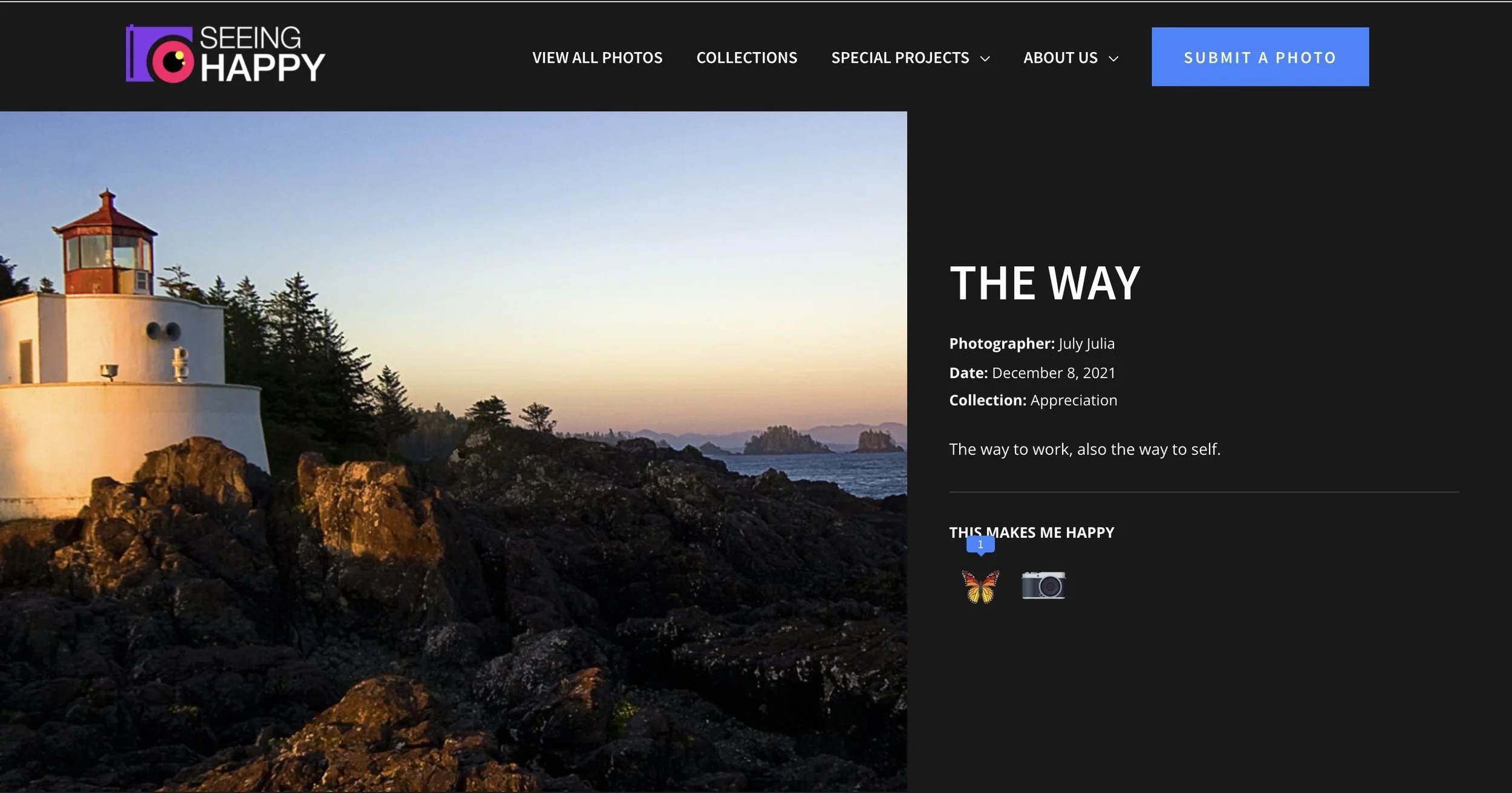
Seeing Happy's community photography project: "The Art of Everyday Happiness"
“What are the little things that make you smile as you go through your day? Often it is the small things that make life worthwhile. And small changes can make a huge difference.
We believe that a small change in focus to the positive can help build personal resilience and hope, and kickstart a spiral of optimism that enables us to deal with life just a little bit better. It can create a cascade of positivity in our lives.
[…] Whether a professional photographer or a casual iPhone-ographer, we invite you to submit the photos that make you happy.”
-
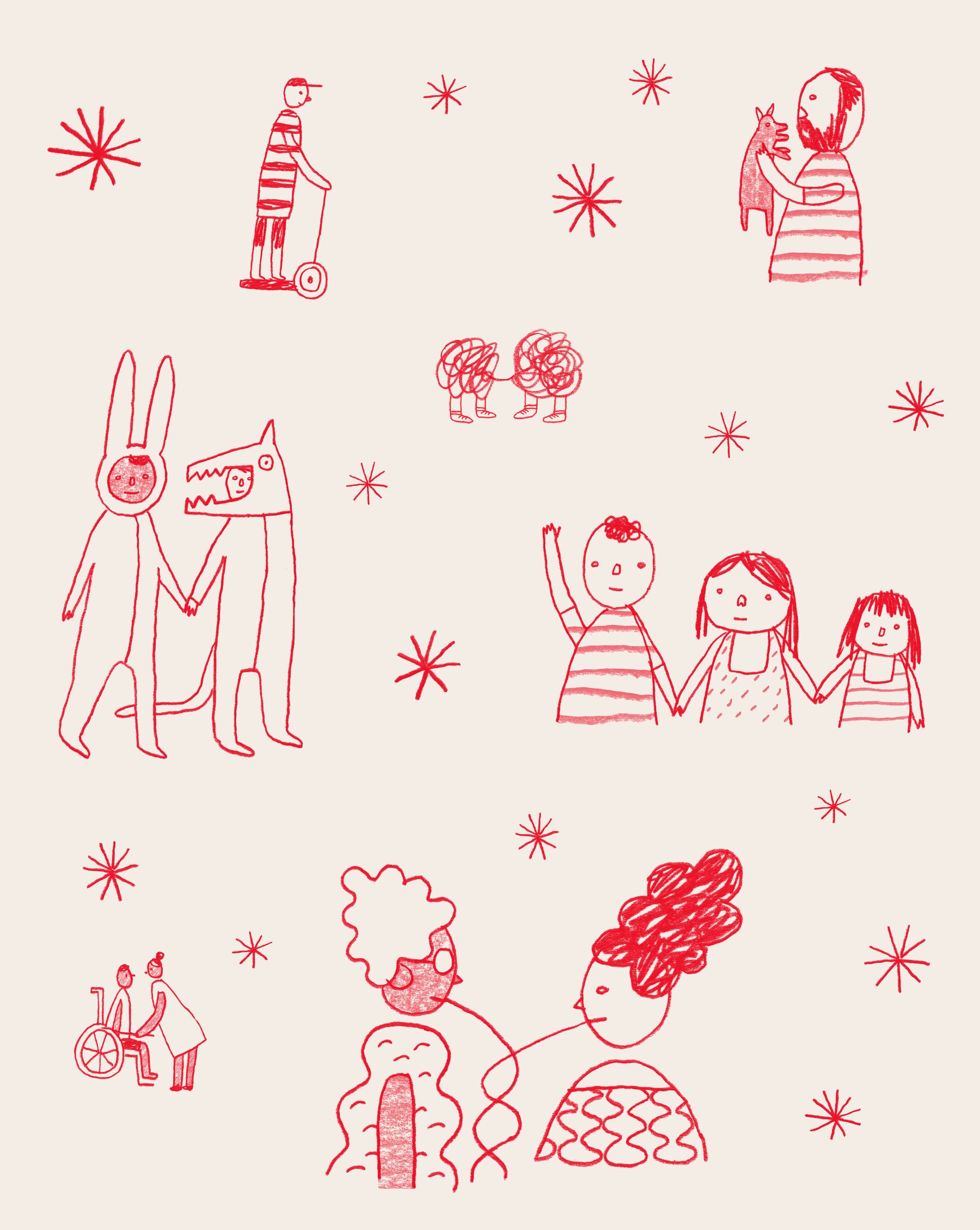
The New York Times's "Modern Love" column & podcast series
“For 16 years, the Modern Love column has given New York Times readers a glimpse into the complicated love lives of real people.
Since its start, the column has evolved into a TV show, three books and a podcast. Now, we are excited to announce a relaunch of the podcast at The Times, hosted by Daniel Jones, the editor and creator of Modern Love, and Miya Lee, editor of Tiny Love Stories and Modern Love projects.
Each week, we’ll bring you their favorite stories from the column’s vast archive, conversations with the authors, and a few surprises. New episodes every Wednesday.”
-

Dr. Frank Andrews's Book, "The Art and Practice of Loving"
From heartfeltyes.com: “One goal transcends all others, one purpose heightens all others, one emotion brings joy to all others: to love fully and without conditions. The most wise men and women of all religious and philosophical traditions have taught the art and practice of loving. Now for the first time, their knowledge has been distilled and collected in this one volume—with 144 practices for cultivating a loving heart.
This is a unique and practical guidebook for loving—deeply and continuously—regardless of what happens to you as you go through life. With the inspiring quotations, valuable exercises, and insightful text of this volume, you can gain the skill and the will to turn living into loving.”
-
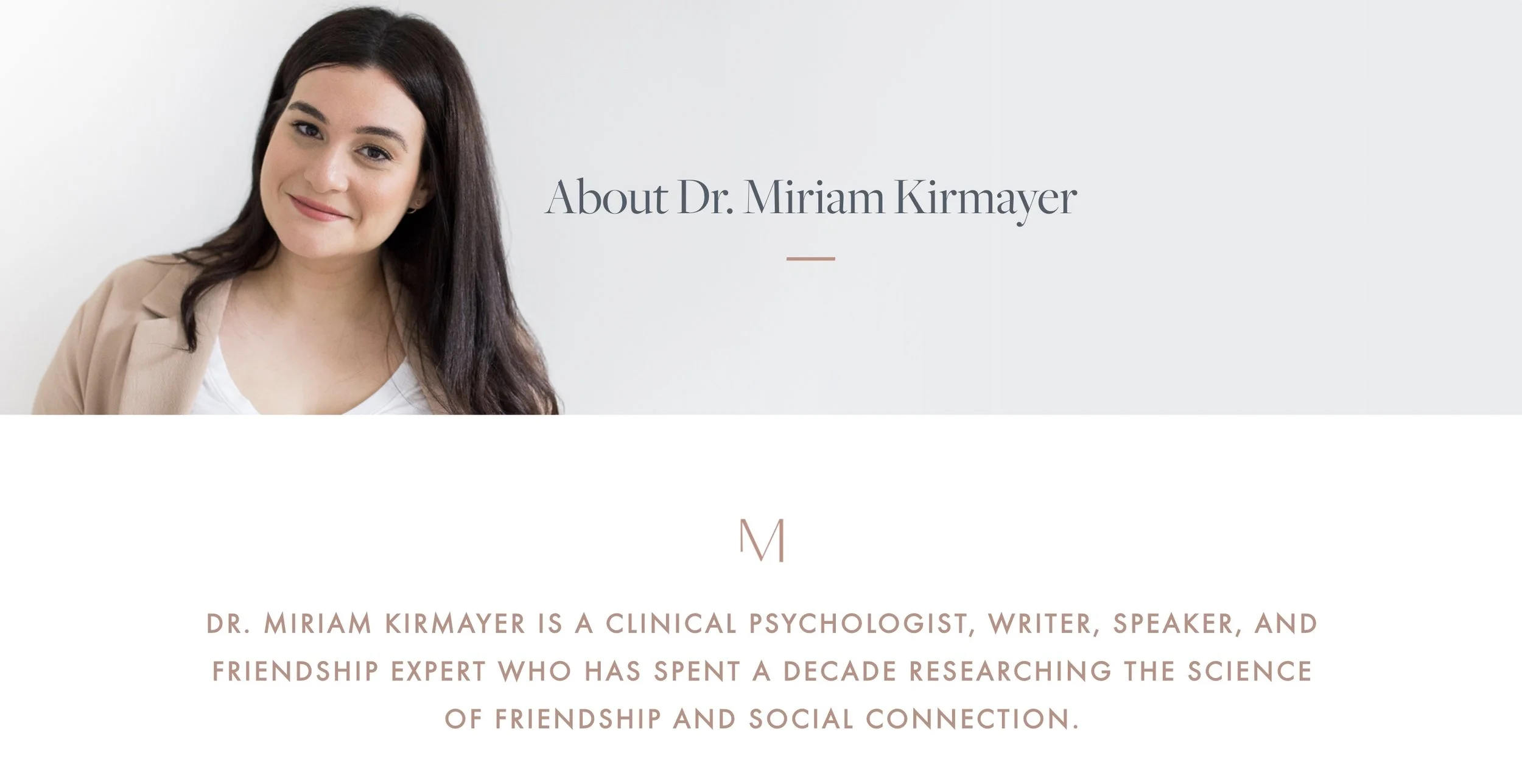
Dr. Miriam Kirmayer's Written Collection About Friendships & Family Relationships
“Dr. Miriam Kirmayer is a Clinical Psychologist, writer, speaker, and friendship expert who has spent a decade researching the science of friendship and social connection. Dr. Kirmayer works with adolescents and adults struggling with anxiety, depression, school and work-related stress, low self-esteem, and relationship difficulties.”
Her articles explore topics such as navigating loneliness during the pandemic, how to make friends as adults, how to handle competitiveness in friendships, and how to communicate with a significant other amidst a conflict.
-

Carissa Potter's "Bad At Keeping Secrets" Newsletter
“Carissa Potter’s prints and small-scale objects reflect her hopeless romanticism through their investigations into public and private intimacy. Speaking both humorously and poignantly to the human condition, Carissa’s work touches chords we all can relate to – exploring situations we’ve all experienced at some point in our lives and conveying messages we simply long to hear.
Bad At Keeping Secrets is a weekly newsletter exploring what it means to be human at this moment. Leaning into the grey areas, letting go of conclusions. They are intimate conversations about accepting who we are and exploring why.”
-
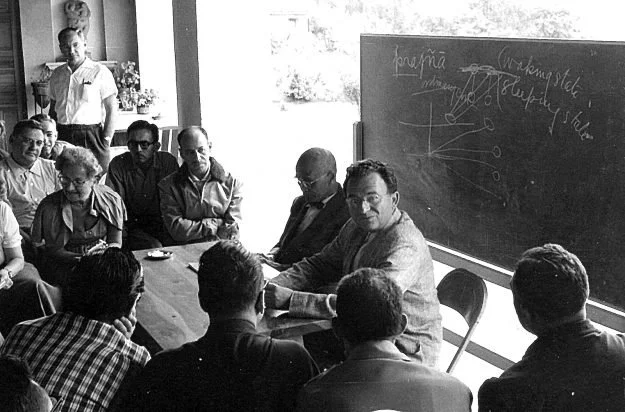
Dr. Erich Fromm's Book, "The Art of Loving"
From Goodreads: “Most people are unable to love on the only level that truly matters: love that is compounded of maturity, self-knowledge, and courage. As with every art, love demands practice and concentration, as well as genuine insight and understanding.
In his classic work, The Art of Loving, renowned psychoanalyst and social philosopher Erich Fromm explores love in all its aspects—not only romantic love, steeped in false conceptions and lofty expectations, but also brotherly love, erotic love, self-love, the love of God, and the love of parents for their children.”

Relevant Vocabulary
-
“According to psychiatrist and psychoanalyst John Bowlby, one’s relationship with their parents during childhood has an overarching influence on their social, intimate relationships and even relationships at work in the future.
In other words, your early relationship with your caregivers sets the stage for how you will build relationships as an adult.”
There are four adult attachment styles:
Anxious (also referred to as Preoccupied)
Avoidant (also referred to as Dismissive)
Disorganized (also referred to as Fearful-Avoidant)
— From The Attachment Project (learn more)
-
Boundaries refer to limits that we have in order to protect our sense of wellbeing and emotional and physical safety. It benefits each of our relationships, from family to romantic partners, to clearly communicate and reinforce our boundaries.
To learn how to establish healthy boundaries, you can visit this page on PositivePsychology.com.
-
“The reactive view of loving implies that in order to evoke delight, a person, object, or event must be unusually delightful. The myth of reactive love holds that to be lovable, something must be especially attractive. […]
When you know only reactive loving, you have few tools for loving more. Your loving depends on the world providing the unusually lovable people or objects you can appreciate. These are, by definition, uncommon, so you will live in a world in which the lovable is scarce. You will spend your life seeking for the few that exist, and when you find one you will cling tightly to it for fear it will leave. Most of the time, rather than feel you have choices in your life, you will feel stuck with what the world offers you.”
— Dr. Frank Andrews, The Art and Practice of Loving
-
“You can choose what you will love and choose to interpret it positively, and thus love intentionally, rather than wait for the occasional flash of reactive loving. This enhances its value as the object of your love. Loving is no delusion; it is an artistic creation.
Artists do not duplicate reality; they paint it, but by doing so they make it important in human life.
You can live in love, in a constant willingness to appreciate and delight in whatever is in your life. Heartwarming experiences flow from that intention; the circumstances just give you the excuse. The world is a screen onto which you project your love. And that is great news. Willfully responding with a yes opens a way of knowing the world that is always available. At this moment, you can choose to love.”
— Dr. Frank Andrews, The Art and Practice of Loving
-
“Depending on how we interpret events, our minds can sometimes play tricks on us. They can convince us of things that aren’t true, even though they feel rational to us.
When these inaccurate beliefs influence our thoughts, emotions, and actions, we can feel anxious, stressed, angry, or depressed about ourselves (or the world around us). These faulty beliefs are known as cognitive distortions.”
Some examples of cognitive distortions include:
expecting the worst outcome in any situation
discounting the positive when things go well
overgeneralizing
jumping to conclusions (“You base your decisions not on what someone says or does, but on what you believe they’re thinking”)
— From the University of Pittsburgh Medical Center (learn more)
-
Conditional love means to impose certain conditions on our love for someone, similar to withholding our care and affection until they have met certain expectations we hold for them. Unconditional love means to freely love someone and always wish the best for them regardless of circumstance.
Both kinds of love are common and equally valid. It is widely thought that the only form of pure, unconditional love we see in daily life is that between parents and children.
-
“Someone who’s gaslighting might:
insist you said or did things you know you didn’t do
deny or scoff at your recollection of events
call you “too sensitive” or “crazy” when you express your needs or concerns
express doubts to others about your feelings, behavior, and state of mind
twist or retell events to shift blame to you
insist they’re right and refuse to consider facts or your perspective
Experiencing gaslighting can leave you second-guessing yourself constantly, not to mention overwhelmed, confused, and uncertain about your ability to make decisions on your own.”
— From Health Line (learn more)
“If you feel that you might be experiencing gaslighting, here are some steps to take:
1) stand firm in your experience (i.e., what you saw, heard, and felt),
2) write things out as they are happening and review your writings,
3) know your purpose before you enter a conversation (because a person who is gaslighting will blatantly lie, shift the narrative, and will minimize how you feel)
4) self-validate and give yourself permission to leave the conversation if the gaslighting turns severe
5) don't worry about trying to "outsmart" the gaslighter with evidence to prove your account of events; disengage instead
6) increase your support system and share your truth”
— From Alyssa Mancao, LCSW, licensed clinical social worker and certified cognitive therapist
-
“Emotional abuse includes non-physical behaviors that are meant to control, isolate, or frighten you. This may present in romantic relationships as threats, insults, constant monitoring, excessive jealousy, manipulation, humiliation, intimidation, dismissiveness, among others.
Sometimes emotional abuse is more obvious, like a partner yelling at you or calling you names. Other times it can be more subtle, like your partner acting jealous of your friends or not wanting you to hang out with someone of another gender.
While these emotionally abusive behaviors do not leave physical marks, they do hurt, disempower, and traumatize the partner who is experiencing the abuse.”
— From the National Domestic Violence Hotline (learn more)
-
Healthy communication “is the ability to convey or share emotions, feelings, sentiments, and desires. Communication can be sent or received through verbal or nonverbal cues. […] While not all communication will be received with a welcoming spirit; healthy communication acknowledges that we have a right to “agree to disagree”.
The key to healthy communication is having a willingness to lay aside our defensive tendencies and accept responsibility for our part of the relationship. Healthy communication entails exercising our active listening skills, reflective listening skills, and having personal insight. If we want to have a healthy relationship, we must establish and seek to maintain healthy communication. “
— From the Canadian Counselling and Psychotherapy Association (learn more)
-
“Gottman refers to bids as ‘the fundamental unit of emotional communication.’ Bids can be small or big, verbal or nonverbal. They’re requests to connect. They might take the form of an expression, question, or physical outreach.
For example, your partner might say, ‘Hey, whatever happened with that situation at work with your manager?’ or, ‘Do you want to talk about our plans this weekend?’ or simply, ‘Can you pass the water?’
They could also give you a loving squeeze, pat you affectionately on the head, or tease you with a wink.
Bids are often purposely subtle because people are afraid to be vulnerable and put themselves out there.”
— Logan Ury, The Gottman Institute
-
“There are three ways you can respond to a bid:
Turning towards (acknowledging the bid)
Turning away (ignoring or missing the bid)
Turning against (rejecting the bid in an argumentative or belligerent way)
Now imagine you’re tidying up the kitchen and your partner asks you how your day was. You could pause, look up from what you’re doing and respond with details about the challenging phone call you had that day. That’s turning towards. You’re telling your partner you see and value them.
Turning away from your partner, in the same situation, would be ignoring them or just grunting and continuing what you were doing.
Turning against them takes the form of an attack, such as replying, ‘Why are you always interrupting me when I’m trying to get things done?’”
— Logan Ury, The Gottman Institute
-
1. Criticism
“The first horseman is criticism. Criticizing your partner is different than offering a critique or voicing a complaint. The latter two are about specific issues, whereas the former is an ad hominem attack. It is an attack on your partner at the core of their character. In effect, you are dismantling their whole being when you criticize.”
Note: To learn the difference between a complaint and a criticism, which is quite help, you can visit this webpage.
2. Contempt
The second horseman is contempt. When we communicate in this state, we are truly mean—we treat others with disrespect, mock them with sarcasm, ridicule, call them names, and mimic or use body language such as eye-rolling or scoffing. The target of contempt is made to feel despised and worthless.
Contempt goes far beyond criticism. While criticism attacks your partner’s character, contempt assumes a position of moral superiority over them.
3. Defensiveness
The third horseman is defensiveness, and it is typically a response to criticism. We’ve all been defensive, and this horseman is nearly omnipresent when relationships are on the rocks. When we feel unjustly accused, we fish for excuses and play the innocent victim so that our partner will back off.
Unfortunately, this strategy is almost never successful. Our excuses just tell our partner that we don’t take their concerns seriously and that we won’t take responsibility for our mistakes.
4. Stonewalling
The fourth horseman is stonewalling, which is usually a response to contempt. Stonewalling occurs when the listener withdraws from the interaction, shuts down, and simply stops responding to their partner. Rather than confronting the issues with their partner, people who stonewall can make evasive maneuvers such as tuning out, turning away, acting busy, or engaging in obsessive or distracting behaviors.
It takes time for the negativity created by the first three horsemen to become overwhelming enough that stonewalling becomes an understandable “out,” but when it does, it frequently becomes a bad habit. And unfortunately, stonewalling isn’t easy to stop. It is a result of feeling physiologically flooded, and when we stonewall, we may not even be in a physiological state where we can discuss things rationally.”
— THREE TAKEAWAYS —
Final Recap
1. Intentional love, effort & connection-building
I always see narratives around “reactive loving” around me — people falling in love, being unable to help their attraction to certain “toxic” traits, etc.
That’s why I was intrigued when I first learned about how we can condition our thoughts to put more emphasis on where we want to direct our love, rather than which objects and people “naturally attract” our love.
The programs and readings above encourage and educate us on how to be more thoughtful, intentional and emotionally intelligent with every aspect of connection-making and relationship-sustaining, from beginning a relationship to healthily resolving conflicts.
It can be comforting to remember that we’re all capable of putting in the effort to bring our best selves to our relationships, create emotional safety for ourselves and others, and see people for who they really are: not allies or enemies, but individuals who are vulnerable and seeking connection and validation just like you.
2. Setting boundaries
While friendships and relationships can be wonderful additions to our lives, it’s important for us to continue to allow our individual identities to be respected and to flourish while maintaining our relationships. An important part of that is creating, communicating and upholding boundaries.
We should take accountability for learning how to communicate our boundaries, but we are not at fault if people choose to continually ignore, test, and/or violate them. Every individual deserves to be treated with the highest regard for their feelings, wishes and rights.
Using the resources on this page, we can learn to know our own limits, initiate important and productive conversations, respect others’ needs and boundaries, stay firm in our own self-worth, needs, and experiences, and avoid emotional dependency on others.
Let’s make sure that the relationships we keep and nurture are the ones that energize us and allow us to grow!
3. We can be unselfish for selfish reasons
One of the top three valuable lessons I learned in the past two years was that being altruistic is a two-way street of benefit, improving givers’ mood, health, cooperation skills, sense of gratitude and connection to their community.
Come to think of it, don’t those benefits sound appealing? I know I would like to feel happy and content more often and more connected to others. So as crazy as it sounds, I think (and apparently, so does research) that we can be selfless for selfish reasons.
Being kind and giving to others is an important muscle that benefits us to flex, empowering us to make a positive impact left and right. So as I shared in my article, Happy Giving, “Why not take a minute to do the following:
1) Reflect on how you can give to others (What are you good at? Where does your power lay? What do you have?); 2) Make your contribution, and; 3) Appreciate the third and final piece of the process—the joy of giving!”

